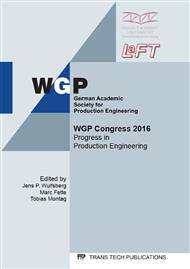p.408
p.419
p.427
p.435
p.443
p.449
p.457
p.465
p.473
Modeling the Sequence Dependent Lateness of a Single Workstation
Abstract:
Due date reliability is a critical competitive factor for manufacturing companies and hence a central objective in logistics. Nonetheless, many businesses are unable to meet their own schedule reliability standards. The reasons for the insufficient achievement of logistical targets are inherent in the diverse and interdependent influential factors that affect schedule reliability. However, logistical models enable to determine these interdependencies. This paper introduces the operating curves of output lateness of a single workstation for various sequencing methods. The parameter studies comprise the preliminary work necessary to provide a complete, model-based description of production schedule deviations.
Info:
Periodical:
Pages:
443-448
DOI:
Citation:
Online since:
August 2016
Authors:
Keywords:
Price:
Сopyright:
© 2016 Trans Tech Publications Ltd. All Rights Reserved
Share:
Citation:


